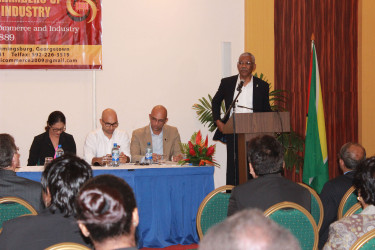President David Granger told the Annual General Meeting of the Georgetown Chamber of Commerce and Industry (GCCI) that the country’s recently held first municipal elections in more than two decades had paved the way for a reappraisal of the contributions that our towns and communities can make towards the creation of economically powerful regions across the country.
“The elections restored the right of citizens to participate in decision-making in their municipalities and neighbourhood councils. They also renewed economic opportunities for innovation, investment and infrastructure development,’ he added at the March 24 forum.
Asserting that local government elections had ushered in new towns at Bartica, Lethem and Mabaruma, in the first instance, President Granger said that these are “intended to wean local authorities off of central government dictation, domination and dependency. They will allow for a more collaborative and forward-looking model of governance.”

According to the Head of State the new model will instil a capital town mind-set, which emphasizes the role of towns in moving beyond providing traditional municipal services. He added, “The new emphasis should be on promoting business, driving economic development and giving leadership to our regions.”
Persisting in the vein of his thesis regarding the nexus between local democracy and economic development, Granger told the assembled businessmen and women that “the new model” was aimed at eradicating what he described as “the colonial town mentality” and instilling a “capital town mind-set which emphasizes the role of towns in moving beyond providing traditional municipal services,” to embracing a “new emphasis” concerned with “promoting business, driving economic development and giving leadership to our regions.”
Noting that strong regions are an essential prerequisite to the development of the country, the President declared that a point had been reached where our regions must be transformed from the status of “administrative appendages of the central government” to becoming motors of economic growth.
Meanwhile, Granger told the chamber gathering that the country’s “new economic geography” will focus on “the centrality of capital towns in fostering economies of scale which are essential to economic growth. Benefits of capital towns in rural and hinterland regions will become evident through the generation of rural, non-farm employment, consumption linkages and urban-rural remittances.”
The President disclosed that a capital town will be established in every region of the country with Bartica serving as the capital town of Cuyuni-Mazaruni, Lethem as the capital town of the Rupununi, Mabaruma as the capital town of the Barima-Waini and Mahdia as the capital town of Potaro-Siparuni. “More suitable sites will be identified to transform …into capital towns in the coastal Demerara-Mahaica, Essequibo Islands-West Demerara and Mahaica-Berbice regions.
“Poorer folk, who always seem to predominate in the rural and hinterland regions, may find employment easier in nearby capital towns than they would when those opportunities are located further away in our country’s few towns and single city,” Granger said, adding that capital towns have an important role to play in developing the economies of our regions by encouraging the growth through the creation of public infrastructure aimed at, among other things, reducing transportation costs, providing access to markets, increasing the competitiveness of production and stimulating increased output. Beyond that, the President said, capital towns will result in the creation of investment flows, new industries and “aid in overcoming competitive disadvantages and diseconomies of scale and by fostering job creation, particularly non-agricultural jobs such as banking and engineering.”
And according to the President, capital towns can compensate for their lack of size by throwing up “big ideas, bold innovations and business dynamism” and levelling the playing field between rural villages and towns through the application of Information and Communication Technology.
“Capital towns, however small at first, will grow into centres of economic vibrancy and engines of economic diversification,” Granger added.





